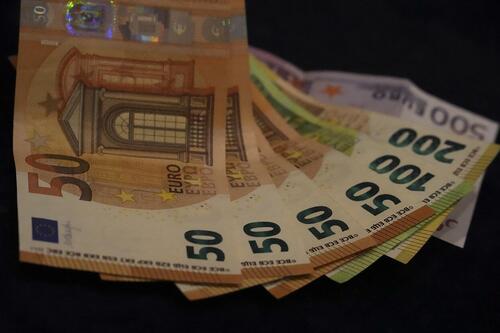
Germany Could Witness A Cash Renaissance As Its Economy Continues To Deteriorate
By Remix News
It may already have seemed that inflation in the West is slowly approaching its peak, but that is not the case. Considering the numbers coming from Germany, inflation may be far from peaking.

Producer prices in Germany increased by a record 45.8 percent year-over-year in September, the same as in August. Energy prices, which rose by 132.2 percent year-over-year, had the most impact on this. The only positive thing about this is that the month-over-month growth slowed a little due to the drop in commodity prices. However, for consumers, it follows that consumer inflation, which lags behind the so-called production inflation, must still climb. We cannot lie about this.
For Germans, however, the following sentence, which German statisticians added as a comment to the numbers, sounds the most frightening: “Compared to the same period last year, August and September recorded the highest increase in producer prices since the start of the survey in 1949.”
Germany is extremely sensitive to mentions of inflation or public debt. To understand why, we have to go back in history. The pre-war hyperinflation in Germany was caused by the fact that Germany could not finance the reparations from World War I. It began to pay its reparations with debt and started to monetize this debt, printing uncovered inflationary money and using it to pay off the debt. The result was hyperinflation and total economic disruption. Many historians believe it was this economic undergrowth that brought Hitler to power and marked World War II.
After the war, Germany, therefore, made a literal 180-degree turn. While before the war it showed enormous fiscal indiscipline, went into debt, printed money, and faced hyperinflation, after the war, on the contrary, it became Europe’s top-of-the-class in fiscal policy. It began scrupulously taking care to keep its public finances under control, not excessively inflating its debt, and not even remotely playing with anything resembling monetization. Jens Wiedmann, former governor of the German central bank, has been the most vocal central banker in Europe when it comes to criticizing the monetization of southern European debt and the policy of negative interest rates that the European Central Bank has begun to commit to in recent years. And it was the German Constitutional Court, through which some of the ECB’s plans of monetizing public debt did not pass.
So we have to understand that for Germany, the current inflation and debt monetization are much more sensitive topics than for any other European country. So far, consumer inflation in Germany is “only” 10 percent, a drop above the average inflation rate in the entire Eurozone, which reached 9.9 percent. Inflation, however, continues to rise.
Economics is not mathematics; economics is mainly about psychology. And here, we begin to encounter very sensitive limits of psychological tolerance. At this moment, inflation has several dimensions. In the first place, the Germans are becoming alarmed and irritated, although they are not yet venting such emotions via mass riots.
Secondly, it is politically very tricky to call a spade a spade. Given the German sensitivities on the mentioned topics, it is simply not politically appropriate to say that inflation is caused by the monetization of European sovereign debt. Rather, they talk about expensive energy, which in turn is linked to the war in Ukraine. They do not directly name the causes. But if we do not identify the causes, we cannot eliminate them, so we cannot solve the problem. The fact that the presidents and prime ministers of the countries of the European Union are trying to find the solution to expensive energy, and talk in particular about the regulation of gas prices, is a testament to this blind stumbling. This is what’s happening instead of admitting the simple facts that, on the one hand, there is more money than goods in circulation and, on the other hand, energy demand is greater than the supply after we voluntarily switched off energy as part of the Green Deal.
And thirdly, people are increasingly fleeing inflation by going into real assets. They can no longer run to mortgages due to the rapidly rising interest rates. Although gold is in great demand in Europe, having a choice between gold and gold is not enough for some people. And so the demand for such things as historical weapons, aged alcohol, or Swiss watches is growing. Exports of Swiss watches rose by 19 percent in September and could be a record this year. A time is coming when people will increasingly use cash instead of bank accounts and pour cash into cashable durables.
************
Source

••••
The Liberty Beacon Project is now expanding at a near exponential rate, and for this we are grateful and excited! But we must also be practical. For 7 years we have not asked for any donations, and have built this project with our own funds as we grew. We are now experiencing ever increasing growing pains due to the large number of websites and projects we represent. So we have just installed donation buttons on our websites and ask that you consider this when you visit them. Nothing is too small. We thank you for all your support and your considerations … (TLB)
••••
Comment Policy: As a privately owned web site, we reserve the right to remove comments that contain spam, advertising, vulgarity, threats of violence, racism, or personal/abusive attacks on other users. This also applies to trolling, the use of more than one alias, or just intentional mischief. Enforcement of this policy is at the discretion of this websites administrators. Repeat offenders may be blocked or permanently banned without prior warning.
••••
Disclaimer: TLB websites contain copyrighted material the use of which has not always been specifically authorized by the copyright owner. We are making such material available to our readers under the provisions of “fair use” in an effort to advance a better understanding of political, health, economic and social issues. The material on this site is distributed without profit to those who have expressed a prior interest in receiving it for research and educational purposes. If you wish to use copyrighted material for purposes other than “fair use” you must request permission from the copyright owner.
••••
Disclaimer: The information and opinions shared are for informational purposes only including, but not limited to, text, graphics, images and other material are not intended as medical advice or instruction. Nothing mentioned is intended to be a substitute for professional medical advice, diagnosis or treatment.





Germany’s hyperinflation was caused by printing “money.” Period. The reparations are totally irrelevant unless you intend to charge Germany with financial crimes.
Only mathematics is about mathematics.
Economics is about resources. Only in the case of great wealth does psychology matter.
The collapse of Europe is about power and corruption.